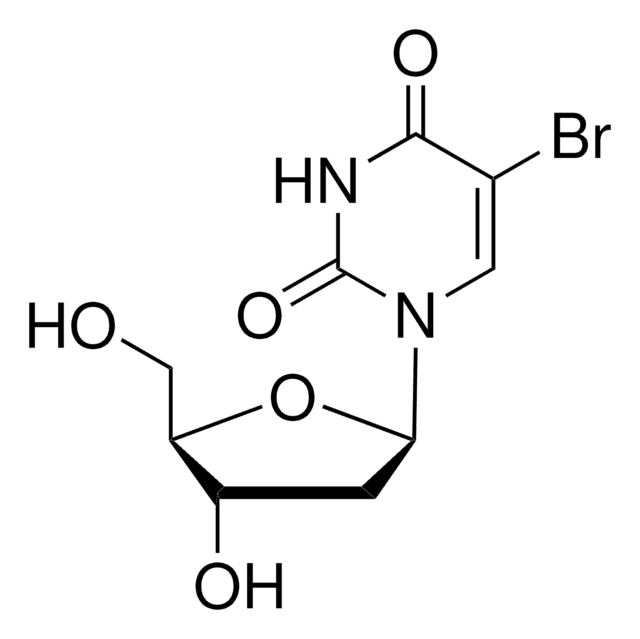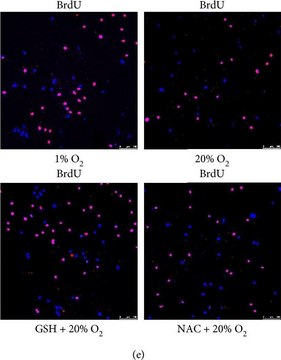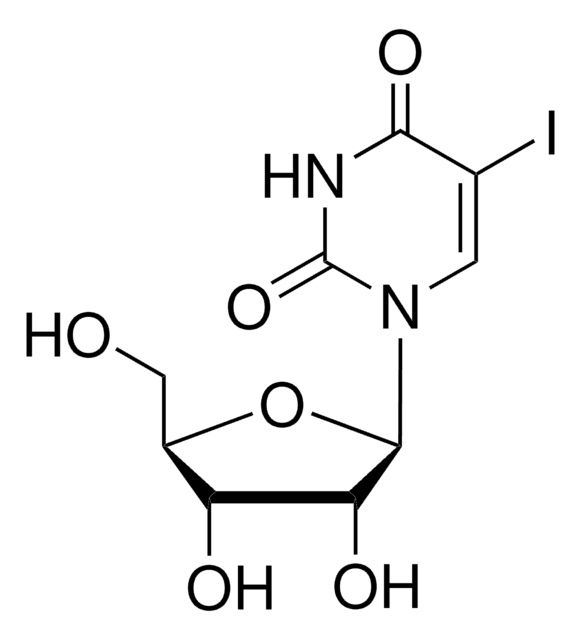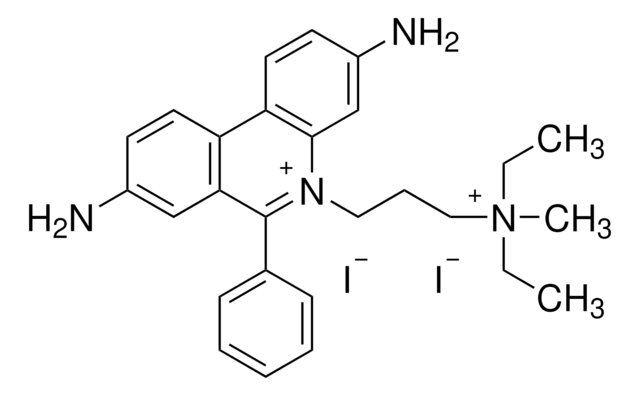추천 제품
Quality Level
분석
≥98% (HPLC)
양식
powder
solubility
1 M NH4OH: 20 mg/mL, clear, colorless to faintly yellow
저장 온도
−20°C
SMILES string
OC[C@H]1O[C@H](C[C@@H]1O)N2C=C(Cl)C(=O)NC2=O
InChI
1S/C9H11ClN2O5/c10-4-2-12(9(16)11-8(4)15)7-1-5(14)6(3-13)17-7/h2,5-7,13-14H,1,3H2,(H,11,15,16)/t5-,6+,7+/m0/s1
InChI key
NJCXGFKPQSFZIB-RRKCRQDMSA-N
유사한 제품을 찾으십니까? 방문 제품 비교 안내
애플리케이션
5-Chloro-2′-deoxyuridine has been used to:
- study cell cycle dynamics by immunohistochemical analysis and double S-phase labeling using animal models
- analyze cell cycle length using an animal model
- label HEK293T cells for molecular combing assay
생화학적/생리학적 작용
DNA labeled with 5-chloro-2′-deoxyuridine (CldU) serves as an effective tool to analyze and quantify DNA replication, repair, and recombination. CldU is a potent mutagen, clastogen, and toxicant. It is used as a thymidine analog and is found to alter the dNTP pools and might lead to cell-cycle arrest. CldU produces sister-chromatid exchange but has less response to ionizing radiation compared to other thymine analogs. 5-Chloro-2′-deoxyuridine (CldU) is used to study the miscoding potential of hypochlorous acid damage to DNA and DNA precursors. When used with antibody based immunofluorescent imaging, 5-Chloro-2′-deoxyuridine incorporation may be used in protocols to identify sites of DNA replication. CldU may be used as a labeling substrate in conjunction with other halogenated uridine labeling substrates such as iododeoxyuridine (IdU).
신호어
Warning
유해 및 위험 성명서
Hazard Classifications
Acute Tox. 4 Dermal - Acute Tox. 4 Inhalation - Acute Tox. 4 Oral - Carc. 2
Storage Class Code
11 - Combustible Solids
WGK
WGK 3
Flash Point (°F)
Not applicable
Flash Point (°C)
Not applicable
개인 보호 장비
dust mask type N95 (US), Eyeshields, Gloves
이미 열람한 고객
S M Ohline et al.
Brain structure & function, 223(7), 3213-3228 (2018-05-26)
Early during their maturation, adult-born dentate granule cells (aDGCs) are particularly excitable, but eventually develop the electrophysiologically quiet properties of mature cells. However, the stability versus plasticity of this quiet state across time and experience remains unresolved. By birthdating two
Masaya Kimoto et al.
The journal of histochemistry and cytochemistry : official journal of the Histochemistry Society, 56(1), 15-24 (2007-09-19)
To identify stem cells in salivary glands, label-retaining cells (LRCs) were established in rat submandibular glands. Developing and regenerating glands were labeled with bromodeoxyuridine (BrdU). To cause gland regeneration, the glands were injured by duct obstruction. BrdU LRCs were observed
Beatrice Rondinelli et al.
Nature cell biology, 19(11), 1371-1378 (2017-10-17)
The emergence of resistance to poly-ADP-ribose polymerase inhibitors (PARPi) poses a threat to the treatment of BRCA1 and BRCA2 (BRCA1/2)-deficient tumours. Stabilization of stalled DNA replication forks is a recently identified PARPi-resistance mechanism that promotes genomic stability in BRCA1/2-deficient cancers.
Fan Xuan et al.
Cell death & disease, 9(11), 1062-1062 (2018-10-20)
MYC-induced nuclear antigen (MINA53) is a JmjC (jumonji C domain)-containing protein, which is highly expressed in many cancers including glioblastoma. We have revealed in our previous report that MINA53 is a poor prognostic indicator for glioblastoma patients, and knockdown of
Eyal Ben-David et al.
Cancer research, 74(19), 5532-5540 (2014-08-16)
Colorectal cancer develops in a sequential, evolutionary process, leading to a heterogenic tumor. Comprehensive molecular studies of colorectal cancer have been previously performed; still, the process of carcinogenesis is not fully understood. We utilized gene expression patterns from 94 samples
자사의 과학자팀은 생명 과학, 재료 과학, 화학 합성, 크로마토그래피, 분석 및 기타 많은 영역을 포함한 모든 과학 분야에 경험이 있습니다..
고객지원팀으로 연락바랍니다.











